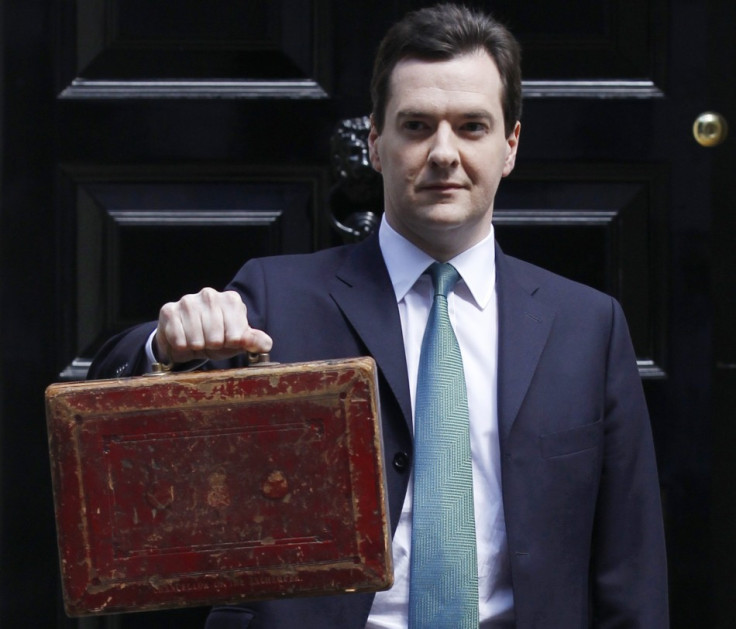IFS Sees Five More Years of Austerity, Debt Target Miss in Osborne's Autumn Budget

Britain's austerity pain may last until 2018 with more tax rises and spending cuts expected in Chancellor George Osborne's impending autumn statement which may also include the scrapping of a key debt target he will almost certainly miss because of a worsening outlook for the economy, according to the Institute for Fiscal Studies (IFS), an influential think tank.
More public spending cuts look set to depress business spending further still, with latest research from consultants Ernst & Young predicting investment lethargy in the coming years, complicating the coalition government's ambition for the private sector to fill in the gaps left by a retreating and pull the country down the path to economic recovery.
"Since the budget, the outlook for the UK economy has deteriorated and government receipts have disappointed by even more than this year's weak growth would normally suggest," said Carl Emmerson, deputy director of the IFS, adding that the "era of austerity" would run until 2018 - now three years longer than originally thought.
The economy plunged into its second recession in four years for the three quarters from the end of 2011 as public austerity bit down hard on the country.
Construction sector activity plunged as public spending disappeared, which weighed heavily on GDP.
When the coalition government took power in May 2010 ministers said that a period of deep public spending cuts lasting until the next parliament would be required to bring down the deficit in national finances left behind by the previous Labour administration.
This was the only way to ensure a sustainable future for public spending in the long term, argued the Conservative-Liberal Democrat coalition, because it would guarantee "fiscal credibility" in the eyes of the bond markets and maintain low interest rates on gilts.
However a renewed downturn in the aftermath of the financial crisis, catalysed by a cocktail of crisis in the eurozone, slowing growth in key emerging markets, volatile commodity prices, and domestic austerity has thrown the government's plans off course and led it to extend its austerity plan, both in value and length.
Now in light of future macroeconomic headwinds, such as the continuing uncertainty from the eurozone, several leading forecasters have slashed their outlook for the UK economy, including the Bank of England and International Monetary Fund (IMF).
Osborne set himself a debt early on in his tenure at the Treasury, a position that now hangs in the balance because of the recent dire economic performance which some claim stems from over-zealous austerity, which he must now admit he cannot meet.
It is likely he will scrap or drastically amend the target in his 5 December autumn statement.
He set the goal of bringing net public debt down as a percentage of GDP by 2015. It currently stands at a total of slightly over £1tn, or 67.9 percent of the country's overall output.
Tax receipts performed worse than expected as the country muddled through the double-dip recession and are unlikely to pick up anytime soon, making it likely the government will have to add more to its debt pile than it had bargained for just to maintain its current level of spending.
The IFS study said for this reason as well as the limited output from the down-trodden economy Osborne will have to find £11bn more in public spending cuts after the next election, which will probably fall in 2015 unless the coalition collapses earlier.
"The chancellor would likely be best advised to abandon the rule and consult on replacing it with something that better ensures long-run sustainability rather than engage in significant further fiscal tightening in order to remain on course to comply with this target," said the IFS report.
Osborne and the government were relying on the private sector picking up the slack left behind by cuts to the public sector, but this advance has largely failed to materialise.
Public spending and the private sector
Critics of the government say public investment is intrinsically linked to private sector expansion, so cutting back will inevitably hurt business and is self-defeating.
Ernst & Young's latest ITEM Club report predicts business investment growth to be just 2.3 percent across 2012, and 3.9 percent in 2013.
This slow pace is "hampering" the recovery, said the report, which blamed negativity and low confidence among businesses for holding back the economy.
"The recovery in UK business investment has been poor," said the ITEM Club report.
"The fundamentals are all in place, but a lack of corporate confidence is holding back major spending decisions and is now hampering UK growth and the rebalancing of the economy."
Continued austerity will likely fuel the uncertainty among businesses about the economy's future.
A consequence would be limited investment as they remain wary of committing cash with no clear chance of making a return and the threat of a triple-dip recession being mooted in light of the worsening global outlook.
Osborne and the government are facing an increasing number of voices calling for a significant fiscal boost for the economy to create jobs and restore business confidence, kick-starting the stalled private sector.
Some say the government should use the record-low gilt yields, held down by the £375bn Bank of England quantitative easing programme of asset purchases, to borrow money cheaply from the markets and pump it directly into the economy.
The subsequent revenues derived from economic growth could be used to erase the deficit, they argue.
However the government has been steadfast in its position on austerity and insists it would be irresponsible to add to the debt pile with more public spending, and would threaten the country's long-term financial stability.
---
Follow @shanecroucher
© Copyright IBTimes 2024. All rights reserved.






